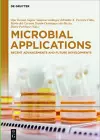
Microbial Applications
5 contributors - Hardback
£156.50
Vijai K. Gupta has previously worked as- Senior Scientist, ERA Chair VALORTECH, Estonian University of Life Sciences, Estonia; Senior Scientist, ERA Chair Green Chemistry, Tallinn Technical University, Estonia and Senior Researcher, Molecular Glycobiotechnology Group Department of Biochemistry. NUI Galway Ireland. Currently, he working as Professor (Associate) of Biochemistry at UM6P University, Morocco. Dr. Gupta’s present work is focused on the development and optimization of novel enzyme-based bioconversion systems for biorefining and bioenergy, bioactive natural products and biomass to bioproduct valorisation using microbial technologies. He has 122 publications with h-index 36 and RG Score 41.25 Susanne Zeilinger studied Microbiology and Genetics at the University of Vienna where she received her PhD in 1995. She gained experience in production and characterization of Trichoderma reesei extracellular proteins during a stay at the VTT Technical Research Center of Finland and pioneered the utilization of molecular biological and genetic engineering tools for the study of Trichoderma species. When working as a post-doctoral researcher at the Institute of Biochemical Technology and Microbiology at the Vienna University of Technology, Susanne Zeilinger’s research focused on cellulase gene regulation. During a stay as visiting scientist at the Institute of Plant Pathology in Portici, Naples, Italy, Susanne Zeilinger extended her knowledge in the field of Trichoderma biocontrol. Back at the Vienna University of Technology, she built her own research group and became group leader at the Research Area of Biotechnology and Microbiology thereby focusing on studies towards the elucidation of the molecular mechanisms underlying Trichoderma mycoparasitism. Since 2015, Susanne Zeilinger is university professor of Microbiology at the University of Innsbruck, Austria, where she currently heads the Mycology division at the Department of Microbiology. She has been honored with several awards such as EMBO, APART (Austrian Academy of Sciences) and FWF (Austrian Science Fund) fellowships, and a research prize of the City of Vienna. Her current research focuses on microbial interactions with a special emphasis on signal transduction and secondary metabolism in mycoparasitic fungi. Susanne Zeilinger has authored over 60 publications and has edited several books. Prof. Harikesh Bahadur Singh is a distinguished Professor at the Department of Biotechnology, GLA University, Mathura, India. He has worked as a Professor and the Head of the Department of Mycology and Plant Pathology, Institute of Agricultural Sciences, Banaras Hindu University, India. Prof. Singh has received several prestigious national awards, such as CSIR Technology Prize for Biological Sciences by Hon’ble Prime Minister of India, M.S. Swaminathan Award by the Society for Plant Research, Mundkar Memorial Award, and BRSI Industrial Medal. His research has resulted in more than 300 publications and 30 edited books. Dr. Irina Druzhinina studied biology at the Lomonosov’s State University in Moscow, Russia, and at the University of Vienna, where she graduated (PhD) in 2001. Thereafter she became a University Assistant in the research area of C.P. Kubicek at Vienna University of Technology, and habilitated in 2011 in “Microbiology. She is now leader of the working group “Microbiology at the same institute.The scientific work of Irina Druzhinina started with a focus on mycology and molecular evolution, working on species diversity and population differentiation in Trichoderma, where she established an online tool for species identification based on DNA barcodes that is today one of the main resources for this purpose for researchers worldwide. In addition, she worked on such diverse topics as phenotype profiling of industrial fungi, peptaibol biosynthesis in Trichoderma, biodiesel production by marine algae, Trichoderma endophytes, biofungicide development and molecular ecology of Trichoderma. In the last years, her interest expanded to ecological genomics, i.e. the use of genome wide information to study the evolutionary adaptation of Trichoderma in its habitats. She acts as a member of the editorial board for Applied and Environmental Microbiology, and is the chair of the International Subcommission on Taxonomy of Trichoderma and Hypocrea, a member of ICTF/IUMS. She published > 60 papers in peer reviewed international journals and edited a book